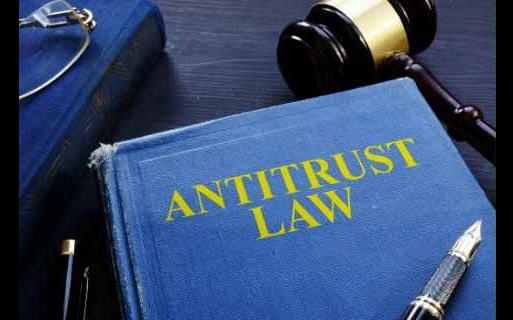How did American Needle, a company that makes hats, end up in a fight with the mighty NFL?
This is a company that was founded in Chicago in 1918 as a family-owned business that imported sewing needles. It quickly evolved into a popular maker of hats of all types, which it still is today.
So, why did American Needle go to court against every team in the NFL? And what happened?
American Needle’s Early History With The NFL

Every NFL team has the right to market its intellectual property. This means anything that uses its logo. Stuff like hats, jerseys, mugs, etc.
Before 1963, NFL teams marketed all their merchandise separately.
In 1963, all the teams in the league formed NFL Properties (NFLP) to jointly handle merchandise licensing with third parties.
One of those third parties was American Needle. This was a Chicago company founded in 1918.
American Needle got a license from NFLP to make and sell hats with NFL team logos.
American Needle Is Squeezed Out
From the foundations of NFLP until 2000, NFLP offered many non-exclusive contracts to various manufacturers.
This all changed in 2000. All the teams voted to allow NFLP to grant exclusive licenses.
NFLP promptly granted a 10-year exclusive license to Reebok to produce hats with NFL logos.
Suddenly, and through no fault of their own, American Needle was out of the NFL team hat business with no chance to get back in or compete.
American Needle promptly filed suit in Federal Court for violations of the Sherman Antitrust Act.
What Happened In The Circuit Court?

American Needle filed a Sherman Act lawsuit in the Federal District Court for the Northern District of Illinois. Their suit was against every NFL team, the NFLP, and Reebok.
American Needle argued that the agreement between the teams and Reebok was an illegal conspiracy to restrain trade, prohibited by the Sherman Act.
The teams, Reebok, and the NFLP filed a motion with the Circuit Court to dismiss the lawsuit.
Their argument hinged on the definition of a conspiracy under the Sherman Act. This requires that businesses that should be in competition actually work together to set prices or block trade.
The lawyers claimed that the NFL teams weren’t really separate teams. Because they had created the NFLP for joint merchandising, they were actually one business entity.
The Circuit Court agreed with the NFL, stating that all the teams were one business. This meant that there could not be a conspiracy.
Based on this, the case was dismissed.
What Happened At The Circuit Court of Appeals?

The Circuit Court of Appeals upheld the decision to dismiss the case.
It based its decision on the fact that cooperation was required for a league to function and it was impossible for any team to function by itself.
The Court said that the league was a single business in competition with other sports and entertainment businesses and that the teams weren’t competitors with each other.
This meant that there couldn’t be a conspiracy.
The Court also took into account the fact that the teams had been licensing their merchandise as a unit since 1963.
What Happened At The Supreme Court?
The Supreme Court agreed to hear the case in 2010.
In this hearing, the only issue was to review the summary judgment dismissal made by the Circuit Court and upheld by the Circuit Court of Appeals.
The Supreme Court reversed the dismissal.
In its decision, the Court agreed that while a single business can’t conspire with itself.
However, they said that something can’t be called a single business just because it organizes itself like one or looks like one.
A Sherman Act review requires that the court looks beyond the mere form that the business creates for itself. The review must actually look to see what’s really going on.
Conspiracy?

In other words, just because several entities come together to form a single entity to do some business, that does not per se mean that they are not a conspiracy.
If it did, any group of businesses that wanted to create a conspiracy to restrain trade could just create a corporation to carry out the conspiracy and be immune to any Sherman Act consequences.
The Court went on to say that a proper anti-trust review looks at whether agreements between separate business interests allow them to act together to stifle trade.
The Court found that, at least for purposes of marketing things like hats and jerseys, the NFL teams were direct competitors with each other.
This means that they are capable of forming a Sherman Act conspiracy.
The Court vacated the Circuit Court’s dismissal and sent the case back to the Circuit Court to reconsider whether there was a violation of antitrust law.
Impact Of America Needle
Much to the frustration of antitrust observers, American Needle didn’t resolve as much as it might have.
There were long delays back in the Circuit Court.
One reason for this was the unfortunate death of the judge. But there was also extended discovery and motions.
All the motions seemed to be going American Needle’s way. However, the company ultimately settled with the NFLP for an undisclosed amount.
This means that the case never went to trial.
An unsatisfactory settlement
Because the case was settled, there’s been no decision on any level as to whether the NFLP’s licensing deals are an antitrust violation or not.
It is highly likely that the NFL was willing to settle precisely because they did not want a Federal decision saying the NFLP was in violation of the Sherman Act.
At that point, it became the wiser choice just to pay American Needle to go away quietly.
What the case did decide was that the NFLP’s decisions weren’t shielded from any Sherman Act review. This may be important further down the line.
More About Anti-Trust And Football
The American Needle case is just one of the anti-trust cases that the football world has been embroiled in. Check out these articles:
Many times, the lawyers will make reference to how baseball is exempt from anti-trust laws.
How did the small-ball sport get away with this? Check out our article on baseball’s anti-trust exemption.